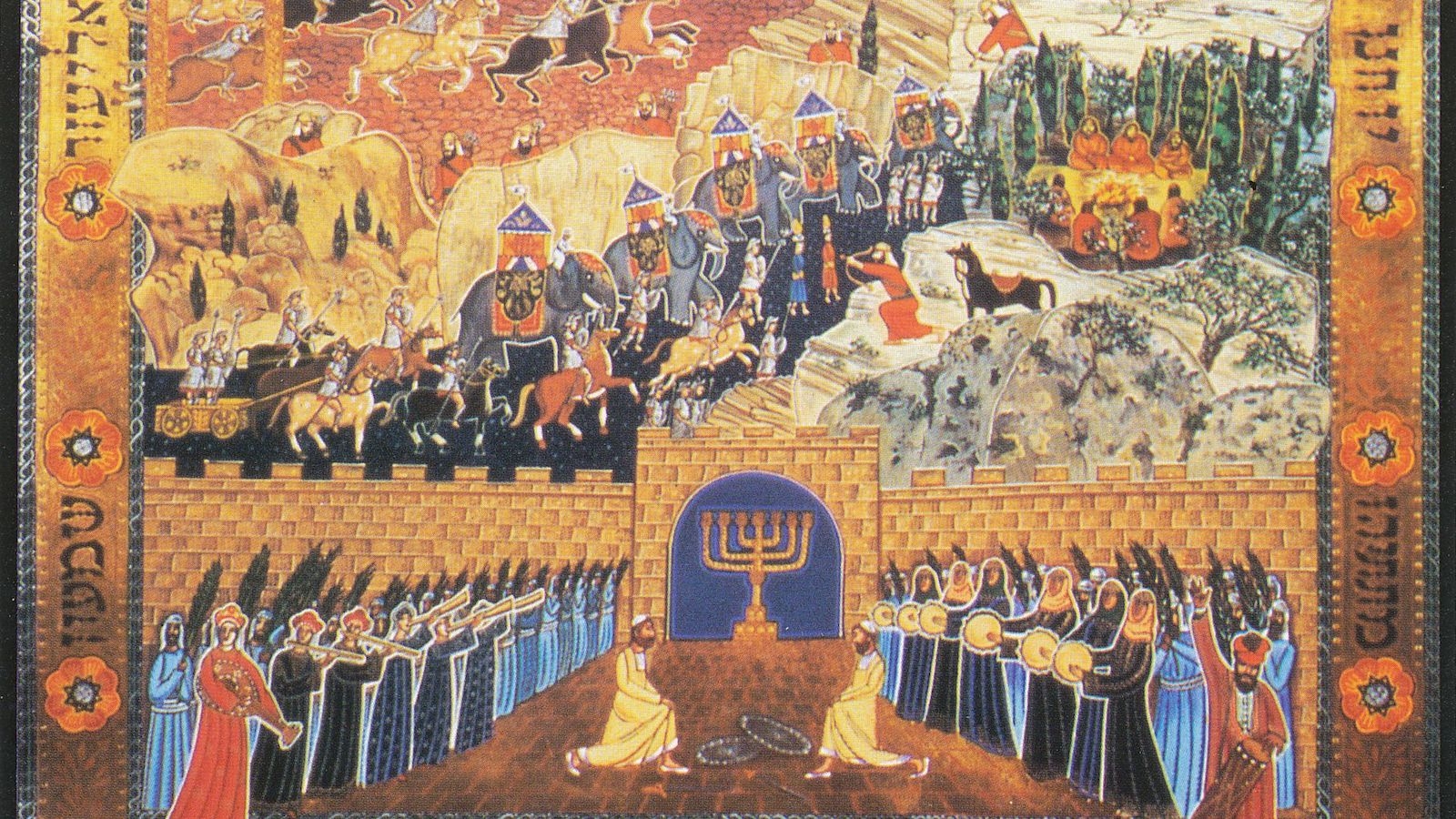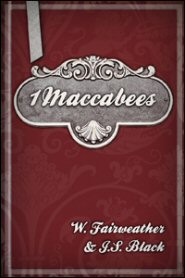This article will cover who the Maccabees where, a breakdown of the two Maccabees books, and what the Scriptural canon outside of 1 and 2 Maccabees has to say about these people. Who were the Maccabees? After Alexander the Great’s life cut off short, four generals divided his land into four territories. 34 Bible Verses about Maccabees Hebrews 4:12 ESV / 5 helpful votes Helpful Not Helpful For the word of God is living and active, sharper than any two-edged sword, piercing to the division of soul and of spirit, of joints and of marrow, and discerning the thoughts and intentions of the heart. The two books of the Maccabees are deuterocanonical. They relate the occupation of Israel by the Greek Seleucid dynasty. They are named for “Maccabeus”, the nickname of Judas son of Mattathias ( 1 Maccabees 2:4 ), who was the leader of the rebellion against Antiochus IV Epiphanes and his persecution of the Jews.
 The First Book of Maccabees
The First Book of MaccabeesThe name Maccabee, probably meaning “hammer,” is actually applied in the Books of Maccabees to only one man, Judas, third son of the priest Mattathias and first leader of the revolt against the Seleucid kings who persecuted the Jews (1 Mc 2:4, 66; 2 Mc 8:5, 16; 10:1, 16). Traditionally the name has come to be extended to the brothers of Judas, his supporters, and even to other Jewish heroes of the period, such as the seven brothers (2 Mc 7).
Fate extra ccc english patch download torrent. Head to the other side of the Fate Extra, the secret place where only the privileged few are allowed to enter. Because of a bug in the system, the Holy Grail wars is mutated. A new game starts, its lure and power draw magicians from across cyberspace. Players are exposed to new dangers and the girls reveal a side of themselves that they have kept hidden in the first game. The person who knows. Read the 'README-patch.pdf' file for more info about the Patches, how to play the game on Android devices, Switches Guide(turning on and off the demosaic patch, changing language, voice options, etc.), Hanafuda Mini-Game Guide, Illya's Castle - Item FAQ, Credits, Version History and more. FATE EXTRA CCC ENG PATCH BY TEAM REVENGE V1.03.EXE is Adware. You should remove the file FATE EXTRA CCC ENG PATCH BY TEAM REVENGE V1.03.EXE. Kill the process FATE EXTRA CCC ENG PATCH BY TEAM REVENGE V1.03.EXE and remove FATE EXTRA CCC ENG PATCH BY TEAM REVENGE V1.03.EXE from Windows. FATE EXTRA CCC ENG PATCH BY TEAM REVENGE V1.03.EXE is known as. Sadly no there isnt a current avaliable patch with translations. The only thing there is avaliable is a Blog translation of the Normal Route with Gilgamesh, but hasnt been put into a patch that works with the game, although there is the ZVN youtube channel that edited videos of the story scenes to have the english text on top of the JP ones(Is only a VIDEO EDIT, its not for the game).
The two Books of Maccabees contain independent accounts of events (in part identical) that accompanied the attempted suppression of Judaism in Palestine in the second century B.C. The vigorous reaction to this attempt established for a time the religious and political independence of the Jews.
First Maccabees was written about 100 B.C., in Hebrew, but the original has not come down to us. Instead, we have an early, pre-Christian, Greek translation full of Hebrew idioms. The author, probably a Palestinian Jew, is unknown. He was familiar with the traditions and sacred books of his people and had access to much reliable information on their recent history (from 175 to 134 B.C.). He may well have played some part in it himself in his youth. His purpose in writing is to record the deliverance of Israel that God worked through the family of Mattathias (5:62)—especially through his three sons, Judas, Jonathan, and Simon, and his grandson, John Hyrcanus. The writer compares their virtues and their exploits with those of Israel’s ancient heroes, the Judges, Samuel, and David.
There are seven poetic sections in the book that imitate the style of classical Hebrew poetry: four laments (1:25–28, 36–40; 2:7–13; 3:45), and three hymns of praise of “our fathers” (2:51–64), of Judas (3:3–9), and of Simon (14:4–15). The doctrine expressed in the book is the customary belief of Israel, without the new developments which appear in 2 Maccabees and Daniel. The people of Israel have been specially chosen by the one true God as covenant-partner, and they alone are privileged to know and worship God, their eternal benefactor and unfailing source of help. The people, in turn, must worship the Lord alone and observe exactly the precepts of the law given to them. The rededication of the Jerusalem Temple described in 4:36–59 (see 2 Mc 10:1–8) is the origin of the Jewish feast of Hanukkah.

Unlike the Second Book of Maccabees, there is no doctrine of individual immortality except in the survival of one’s name and fame, nor does the book express any messianic expectation, though messianic images are applied historically to “the days of Simon” (1 Mc 14:4–17). In true Deuteronomic tradition, the author insists on fidelity to the law as the expression of Israel’s love for God. The contest which he describes is a struggle, not simply between Jew and Gentile, but between those who would uphold the law and those, Jews or Gentiles, who would destroy it. His severest condemnation goes, not to the Seleucid politicians, but to the lawless apostates among his own people, adversaries of Judas and his brothers, who are models of faith and loyalty.
The first and second Books of Maccabees, though regarded by Jews and Protestants as apocryphal, i.e., not inspired Scripture, because not contained in the Jewish list of books drawn up at the end of the first century A.D., have always been accepted by the Catholic Church as inspired and are called “deuterocanonical” to indicate that they are canonical even though disputed by some.
First Maccabees can be divided as follows:
- I. Crisis and Response (1:1–2:70)
- II. Leadership of Judas Maccabeus (3:1–9:22)
- III. Leadership of Jonathan (9:23–12:53)
- IV. Leadership of Simon (13:1–16:24)
The Maccabees were Jewish leaders who took part in a revolt against the Seleucids between 175 and 134 BC. First Maccabees covers the efforts of the Jewish people to regain their freedom following the desecration of the temple by Antiochus IV Epiphanes.
Second Maccabees includes a different edition of the first seven chapters of 1 Maccabees and was written at a later date, likely in Alexandria, Egypt. The author is unknown. He claims to provide a shortened version of a five-volume history by Jason of Cyrene.
During this time period, an older priest named Mattathias lived with his five sons. When Antiochus commanded some soldiers to Mattathias' village of Modein to force Jews to offer sacrifices to pagan gods, the priest was commanded to do so first. Mattathias refused, offering a powerful speech (1 Maccabees 2:15-22). Another Jew offered to take his place, but Mattathias killed him as well as the soldiers in response. He also destroyed the pagan altar and led many followers to hide in the wilderness. Their newly-formed revolt began conducting military battles against other towns to destroy pagan altars, killing enemies, and putting to death Jews who worshiped other gods.
Mattathias died early in the revolt and his son Judas led in his place. Against many foes, the rebels continued to win, including the defeat of 50,000 soldiers in one battle. The group became known as the 'Maccabees;' Judas was given the nickname 'Maccabeus' for his ability to 'hammer' enemy forces into the ground. Antiochus responded to the Maccabean Revolt with an even larger army to destroy the Jews in Emmaus. Judas prayed to God and won a victory with only 10,000 on his side. After their victory, he led the Jews to Jerusalem to cleanse the temple.
Both 1 and 2 Maccabees offer an important history that forms the background of the Jewish Hannukah holiday that celebrates the cleansing and restoration of the temple. Jonathan, another of Mattathias' sons, became new high priest after the rededication of the temple and also became commander of the army. First Maccabees concludes with the line of Maccabean leaders who followed, including Simon, another of Mattathias' sons, and Simon's son John Hyrcanus.
Though it includes a compelling historical account, there are concerning theological teachings particularly in 2 Maccabees. One concerning theological teaching from 2 Maccabees is the concept of praying on behalf of the dead (2 Maccabees 12:34-35). Second, 2 Maccabees 15:14 speaks of Jeremiah praying for the people on Earth, introducing what Catholics teach as the prayers of the saints, a doctrine not found in the Old and New Testaments. Third, the Catholic teaching regarding purgatory comes from 2 Maccabees 12:46 that reads, 'It is therefore a holy and wholesome thought to pray for the dead, that they may be loosed from sins.' The belief is that people first enter purgatory upon death (at least in some cases) and that the actions of believers on Earth can help a person move to heaven. This teaching is only found in this book which is not considered Scripture by Protestants or Jews.
First Book Of Maccabees
